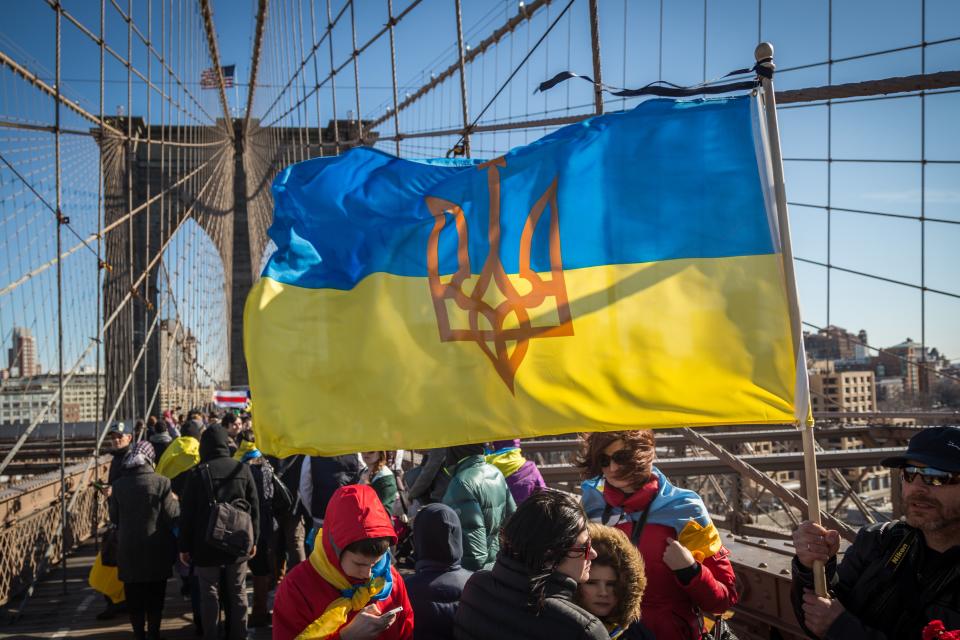How the Republicans' “No Quid Pro Quo” Defense Backfired
During his testimony for the impeachment inquiry last Tuesday, top U.S. diplomat Bill Taylor told lawmakers that Donald Trump was clear to his subordinates that he wanted public pledges from Ukraine to: (1) investigate former vice president Joe Biden's son and his connection to the Ukrainian company Burisma; and (2) to look into a baseless conspiracy theory that Ukraine, not Russia, was behind foreign interference in the 2016 U.S. elections. The president's goal, according to Taylor, was to put Ukrainian president Volodymyr Zelensky "in a public box," and leave him no choice but to carry out those investigations.
Due to an ongoing conflict with Russia, Ukraine is heavily dependent on American military aid, and at the time of the now infamous call, the newly-elected Zelensky was eager to receive a formal White House invitation that would boost his stature both at home and in the international community. Taylor's damning allegations portray an uncomplicated abuse of executive power: Trump withheld congressionally-appropriated aid and a Rose Garden photo op in order to extract a promise from Ukraine to conduct a politically-motivated investigation of his personal rival.
Since Democrats announced an impeachment inquiry in late September, Republican lawmakers have hit one particular talking point: that there was no quid pro quo. "At the end of the day, this was about quid pro quo and whether or not the Ukrainians were aware that military aid was being withheld," argued Texas congressman John Ratcliffe on Fox News. "Neither [Taylor] or any other witness has provided any evidence that there was a quid pro quo, or any evidence that the Ukrainians were aware that military aid was being withheld on July 25"—the date of Trump's infamous "do us a favor" phone call with Zelensky.
Here, Ratcliffe is using a very particular definition of quid pro quo—a favor exchanged for another favor, where both parties know exactly what is at stake—as the standard for presidential misconduct. Unless evidence emerges that Ukraine knew that hundreds of millions of dollars in aid hung in the balance when Trump asked for a "favor," Ratcliffe asserted that "a quid pro quo is legally impossible." No knowledge, no quid pro quo; no quid pro quo, no impeachment. The congressman's line of reasoning earned an Oval Office tweet of approval early on Wednesday.
This has been a risky strategy for the president's defenders, because the impeachability of Trump's conduct will not necessarily turn on whether Ukraine understood the precise contours of his extortion attempt as it was taking place. Impeachment is a tool for prosecuting abuses of power, and the constitutional standard is "treason, bribery, or other high crimes and misdemeanors," not "a quid pro quo as a certain contingent of Republican lawmakers define it on Fox News." Given the obvious power imbalance between the two countries, the House could easily conclude that a U.S. president's demand that Ukraine do something to benefit him politically—and his admonition to Zelensky that complying is "very important"—is coercive all by itself, regardless of whether Zelensky knew what "favors" he stood to lose by refusing to act.
Constitutional particulars aside, however, on Wednesday morning, New York Times reporting refuted that argument: Ukraine had learned that the U.S. had frozen the promised military aid by the first week in August—after the Trump-Zelensky phone call on July 25, but still well within the period when Trump attorney Rudy Giuliani was pressuring the Zelensky administration to take action.
The problem was not a bureaucratic glitch, the Ukrainians were told then. To address it, they were advised, they should reach out to Mick Mulvaney, the acting White House chief of staff, according to the interviews and records.
...
The communications did not explicitly link the assistance freeze to the push by Mr. Trump and Mr. Giuliani for the investigations. But in the communications, officials from the United States and Ukraine discuss the need to bring in the same senior aide to Mr. Zelensky who had been dealing with Mr. Giuliani about Mr. Trump’s demands for the investigations, signaling a possible link between the matters.
To date, Ukrainian officials have downplayed allegations of U.S. misconduct by claiming that they didn't know about the blocked aid until the end of August, well after Trump and his associates made their various demands for a Biden investigation. "There was no blackmail," Zelensky said earlier this month.
But Ukraine has an obvious incentive to toe this line in public: to cover for an ally they cannot afford to antagonize. Sure enough, the Times notes, "[t]he Ukrainians appear to have initially been hopeful that the problem could be resolved quietly and were reluctant to risk a public clash at a delicate time in relations between the two nations." Even if Ukraine didn't know about the suspended aid on July 25, the date of the Trump-Zelensky conversation, they knew about it for nearly the entire month of uncertainty that followed.
As a legal argument, Ratcliffe and company's "no knowledge, no quid pro quo" defense to impeachment was already flimsy and unpersuasive. Now, less than 24 hours after Republicans in Congress pushed this talking point in its response to Taylor's testimony, it appears to lack factual support, too. To borrow Ratcliffe's standard, Ukrainian officials were "aware that military aid was being withheld." Or, to put it differently, they understood Trump's quid pro quo perfectly well.
Whether it’s Paul Manafort or Hunter Biden and Donald Trump, Ukraine seems to play a disproportionately popular role in our nation’s recent controversies. Julia Ioffe explains why the same small country is increasingly involved in America’s political chaos.
Originally Appeared on GQ


